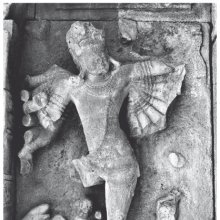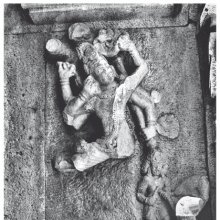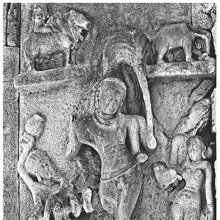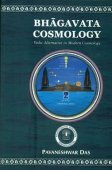Svarga, Swarga: 26 definitions
Introduction:
Svarga means something in Buddhism, Pali, Hinduism, Sanskrit, Jainism, Prakrit, the history of ancient India, Marathi, Hindi. If you want to know the exact meaning, history, etymology or English translation of this term then check out the descriptions on this page. Add your comment or reference to a book if you want to contribute to this summary article.
Alternative spellings of this word include Swarg.
Images (photo gallery)
In Hinduism
Natyashastra (theatrics and dramaturgy)
Source: archive.org: The mirror of gesture (abhinaya-darpana)One of the Hands of The Seven Upper Worlds.—Svarga: the Patāka hand twisted upwards is applicable.

Natyashastra (नाट्यशास्त्र, nāṭyaśāstra) refers to both the ancient Indian tradition (shastra) of performing arts, (natya—theatrics, drama, dance, music), as well as the name of a Sanskrit work dealing with these subjects. It also teaches the rules for composing Dramatic plays (nataka), construction and performance of Theater, and Poetic works (kavya).
Purana and Itihasa (epic history)
Source: archive.org: Shiva Purana - English TranslationSvarga (स्वर्ग) refers to “heaven” (i.e., Svarga signifies the heaven of Indra which is supposed to be situated on Mount Meru), according to the Śivapurāṇa 2.3.32 (“The seven celestial sages arrive”).—Accordingly, as the Seven Sages said amongst each other (when arriving at Himavatpura city): “This city seems to be better than Alakā, heaven (svarga), Bhogavatī and even Amarāvatī. The houses are beautiful and well-built. The courtyards are well laid out and paved with different kinds of crystals and jewels of variegated colours. Slabs of solar and lunar stones are found in every house. Different kinds of celestial trees are also growing here. [...]”.
Source: Cologne Digital Sanskrit Dictionaries: The Purana Index1a) Svarga (स्वर्ग).—A son of Jāmi and Dharma, father of Nandi.*
- * Bhāgavata-purāṇa VI. 6. 6.
1b) A son of Bhīma and Diks.*
- * Brahmāṇḍa-purāṇa II. 10. 82; 27. 54.
1c) The heaven;1 seven gates for; tapas, dāna, sāma, dama, hrīḥ, ārjavam, and sympathy for all creatures;2 all these possessed by Śibi;3 reached by Yayāti with his four grandsons;4 for the worship of Agastya.5
- 1) Vāyu-purāṇa 34. 96; 41. 82; 103. 42; 108. 76 and 84.
- 2) Matsya-purāṇa 39. 22.
- 3) Ib. 42. 20.
- 4) Ib. 42. 28.
- 5) Ib. 553. 29; 61. 55.

The Purana (पुराण, purāṇas) refers to Sanskrit literature preserving ancient India’s vast cultural history, including historical legends, religious ceremonies, various arts and sciences. The eighteen mahapuranas total over 400,000 shlokas (metrical couplets) and date to at least several centuries BCE.
Kavya (poetry)
Source: Wisdom Library: KathāsaritsāgaraSvarga (स्वर्ग) is the name of Śiva’s abode on top of mount Kailāsa that was visited by Sūryaprabha in order to invite Śiva and Ambikā for his coronation, according to the Kathāsaritsāgara, chapter 50. Accordingly: “... and at last he [Sūryaprabha] reached on the top of the mountain [Kailāsa] an eighth door of crystal. Then he praised Śiva, and he was introduced courteously by one of the Rudras, and beheld that abode of Śiva that excelled Svarga, in which blew winds of heavenly fragrance, in which the trees ever bore fruit and flowers, in which the Gandharvas had begun their concert, which was all joyous with the dancing of Apsarases. Then, in one part of it, Sūryaprabha beheld with joy the great god Śiva, seated on a throne of crystal”.
The Kathāsaritsāgara (‘ocean of streams of story’), mentioning Svarga, is a famous Sanskrit epic story revolving around prince Naravāhanadatta and his quest to become the emperor of the vidyādharas (celestial beings). The work is said to have been an adaptation of Guṇāḍhya’s Bṛhatkathā consisting of 100,000 verses, which in turn is part of a larger work containing 700,000 verses.

Kavya (काव्य, kavya) refers to Sanskrit poetry, a popular ancient Indian tradition of literature. There have been many Sanskrit poets over the ages, hailing from ancient India and beyond. This topic includes mahakavya, or ‘epic poetry’ and natya, or ‘dramatic poetry’.
Vaishnavism (Vaishava dharma)
Source: Pure Bhakti: Brhad BhagavatamrtamSvarga (स्वर्ग) refers to:—The celestial heaven, greatest of all heavens, that is characterized by material opulence, enjoyment, and duration of life far exceeding those of the planet earth. Svarga is attained by strictly carrying out the pious activities recommended in the karma-kāṇḍa section of the Vedas. (cf. Glossary page from Śrī Bṛhad-bhāgavatāmṛta).

Vaishnava (वैष्णव, vaiṣṇava) or vaishnavism (vaiṣṇavism) represents a tradition of Hinduism worshipping Vishnu as the supreme Lord. Similar to the Shaktism and Shaivism traditions, Vaishnavism also developed as an individual movement, famous for its exposition of the dashavatara (‘ten avatars of Vishnu’).
Shaivism (Shaiva philosophy)
Source: Brill: Śaivism and the Tantric Traditions (philosophy)Svarga (स्वर्ग) refers to “heaven”, according to Utpaladeva’s Vivṛti on Īśvarapratyabhijñākārikā 1.5.6.—Accordingly, “[...] Ordinary human practice [can even occur] with an object such as the sense organs, or heaven and liberation (svarga-apavarga), although [these always remain] beyond the reach of the sense organs, [but] only inasmuch as they are [somehow] manifest in the concept [representing them]. And [since it is] so, being an object is nothing but having a form that is [presently] being manifest, and the goal [of human practice] only concerns what is merely such [and nothing beyond manifestation]”

Shaiva (शैव, śaiva) or Shaivism (śaivism) represents a tradition of Hinduism worshiping Shiva as the supreme being. Closely related to Shaktism, Shaiva literature includes a range of scriptures, including Tantras, while the root of this tradition may be traced back to the ancient Vedas.
Ganitashastra (Mathematics and Algebra)
Source: archive.org: Hindu MathematicsSvarga (स्वर्ग) represents the number 21 (twenty-one) in the “word-numeral system” (bhūtasaṃkhyā), which was used in Sanskrit texts dealing with astronomy, mathematics, metrics, as well as in the dates of inscriptions and manuscripts in ancient Indian literature.—A system of expressing numbers by means of words arranged as in the place-value notation was developed and perfected in India in the early centuries of the Christian era. In this system the numerals [e.g., 21—svarga] are expressed by names of things, beings or concepts, which, naturally or in accordance with the teaching of the Śāstras, connote numbers.

Ganitashastra (शिल्पशास्त्र, gaṇitaśāstra) refers to the ancient Indian science of mathematics, algebra, number theory, arithmetic, etc. Closely allied with astronomy, both were commonly taught and studied in universities, even since the 1st millennium BCE. Ganita-shastra also includes ritualistic math-books such as the Shulba-sutras.
Ayurveda (science of life)
Toxicology (Study and Treatment of poison)
Source: Shodhganga: Kasyapa Samhita—Text on Visha ChikitsaSvarga (स्वर्ग) refers to the “heavens” and is mentioned as one of the dwelling places of Snakes (Sarpas), as taught in the Kāśyapa Saṃhitā: an ancient Sanskrit text from the Pāñcarātra tradition dealing with both Tantra and Viṣacikitsā—an important topic from Āyurveda which deals with the study of Toxicology (Agadatantra or Sarpavidyā).—The Kāśyapasaṃhitā (verse IV.19) makes a passing reference about the dwelling of sarpas which include the heavens (svarga), oceans, nether world, mountains and earth.

Āyurveda (आयुर्वेद, ayurveda) is a branch of Indian science dealing with medicine, herbalism, taxology, anatomy, surgery, alchemy and related topics. Traditional practice of Āyurveda in ancient India dates back to at least the first millenium BC. Literature is commonly written in Sanskrit using various poetic metres.
Sports, Arts and Entertainment (wordly enjoyments)
Source: archive.org: Syainika Sastra of Rudradeva with English Translation (art)Svarga (स्वर्ग) refers to “heaven”, according to the Śyainika-śāstra: a Sanskrit treatise dealing with the divisions and benefits of Hunting and Hawking, written by Rājā Rudradeva (or Candradeva) in possibly the 13th century.—Accordingly, “[...] There is another way, charming in itself, for the attainment of the highest bliss. Heaven (svarga) is easily attained by the performance of duties prescribed for one’s caste. So one should devote himself to karma leading to heaven (svarga), to fame, and to longevity. The conclusion of the Vedas is summed up in these words, ‘Continually doing work, etc.’ [...]”.

This section covers the skills and profiencies of the Kalas (“performing arts”) and Shastras (“sciences”) involving ancient Indian traditions of sports, games, arts, entertainment, love-making and other means of wordly enjoyments. Traditionally these topics were dealt with in Sanskrit treatises explaing the philosophy and the justification of enjoying the pleasures of the senses.
General definition (in Hinduism)
Source: WikiPedia: HinduismIn Hinduism, Svarga (or Swarga) (Sanskrit: स्वर्ग) also known as Swarga Loka is a one of seven loka or planes in Hindu cosmology, which sequentially are Bhu loka (Prithvi Loka, Earth), Bhuvar loka, Swarga loka, Mahar loka, Jana loka, Tapa loka, and the highest Satyaloka (Brahmaloka). It set of heavenly worlds located on and above Mt. Meru. It is a heaven where the righteous live in a paradise before their next reincarnation. During each pralaya or the great dissolution, the first three realms are destroyed that is Bhu loka (Earth), Bhuvar loka, Swarga loka. Below all these upper realms lie seven realms of Patala, the underworld and netherworld.
Svarga is seen as a transitory place for righteous souls who have performed good deeds in their lives but are not yet ready to attain moksha, or elevation to Vaikunta, the abode of Lord Vishnu, considered to be the Supreme Abode (Rig Veda (1.22.20) states,
Oṃ tad viṣṇoḥ paramam padam sadā paśyanti sūrayaḥ:
"All the suras (i.e. devas- divinities) look towards the feet of Lord Vishnu as the Supreme Abode)".
The capital of Svarga is Amaravati and its entrance is guarded by Airavata. Svarga is presided over by Indra, the chief deva.
In Buddhism
Mahayana (major branch of Buddhism)
Source: Wisdom Library: Maha Prajnaparamita SastraSvarga (स्वर्ग) refers to “heavenly (beings)”, according to Mahāprajñāpāramitāśāstra (chapter 4).—Accordingly, “[...] By saying ‘gods’, all the heavenly (svarga) beings are included; by saying ‘men’, all the beings on the earth (pṛthivī) are included. Why? Because in the heavens, the gods are the principal (adhimātra) beings, and on earth, men are the principal beings. Therefore by saying “gods” all the beings in the heavens are included, and by saying ‘men’ all the beings on the earth are included”.

Mahayana (महायान, mahāyāna) is a major branch of Buddhism focusing on the path of a Bodhisattva (spiritual aspirants/ enlightened beings). Extant literature is vast and primarely composed in the Sanskrit language. There are many sūtras of which some of the earliest are the various Prajñāpāramitā sūtras.
In Jainism
General definition (in Jainism)
Source: The University of Sydney: A study of the Twelve ReflectionsSvarga (स्वर्ग) refers to “heaven”, according to the 11th century Jñānārṇava, a treatise on Jain Yoga in roughly 2200 Sanskrit verses composed by Śubhacandra.—Accordingly, “Whatever objects, sentient and non-sentient, there are in the three worlds [com.—in heaven, earth (lit: mortality) and hell (svargamṛtyupātāle)], they all are described by mendicant as continually transitory. The meeting of beloved women is like a city in the sky. Youth or wealth is like a mass of clouds. Relations, children and bodies, etc. are perishable as lightning. You must understand that the whole action of the cycle of rebirth is thus momentary”.
Synonyms: Loka.

Jainism is an Indian religion of Dharma whose doctrine revolves around harmlessness (ahimsa) towards every living being. The two major branches (Digambara and Svetambara) of Jainism stimulate self-control (or, shramana, ‘self-reliance’) and spiritual development through a path of peace for the soul to progess to the ultimate goal.
India history and geography
Source: Cologne Digital Sanskrit Dictionaries: Indian Epigraphical GlossarySvarga.—(IE 7-1-2), ‘twentyone’. Note: svarga is defined in the “Indian epigraphical glossary” as it can be found on ancient inscriptions commonly written in Sanskrit, Prakrit or Dravidian languages.

The history of India traces the identification of countries, villages, towns and other regions of India, as well as mythology, zoology, royal dynasties, rulers, tribes, local festivities and traditions and regional languages. Ancient India enjoyed religious freedom and encourages the path of Dharma, a concept common to Buddhism, Hinduism, and Jainism.
Languages of India and abroad
Marathi-English dictionary
Source: DDSA: The Molesworth Marathi and English Dictionarysvarga (स्वर्ग).—m (S) The heaven or paradise of Indra. As svarga is the main region in which mortals receive the reward of their virtuous actions, this word, although faulty, is better suited than any of the other existing words (e. g. dēvalōka, ūrdhvalōka, bhuvarlōka, paralōka, ākāśa) to render the Christian term Heaven. Indra will pass away, and Swarg will be purified from its sensuousness. 2 This word, as of the paradise which it signifies the site is in the zenith, is frequently used in the sense of Sky or heavens. mēlyāvāñcūna svarga disata nāhīṃ No good is to be enjoyed or obtained without undergoing some trouble or difficulty. svarga dōna bōṭēṃ uralā with lā or sa of s. The heavens are distant (from him &c.) by two fingerbreadths. Phrase descriptive of a lofty and lordly person. svargācī vāṭa (Way to heaven.) A polite or soft name for Departure from life. svargāsa hāta pōñcaṇēṃ (The hand to reach unto the skies.) A phrase expressive of the attainment or accomplishment of some superlative good. svargīṃ dhaja lāvaṇēṃ To perform a mighty exploit.
Source: DDSA: The Aryabhusan school dictionary, Marathi-Englishsvarga (स्वर्ग).—m The heaven or paradise of Indra. mēlyāvāñcūna svarga disata nāhīṃ No good is to be obtained without undergoing some trouble. svargācī vāṭa A polite name for departure from life. svargī dhvaja lāvaṇēṃ Perform a mighty exploit.
--- OR ---
svarga (स्वर्ग).—a Relating to svarga.
Marathi is an Indo-European language having over 70 million native speakers people in (predominantly) Maharashtra India. Marathi, like many other Indo-Aryan languages, evolved from early forms of Prakrit, which itself is a subset of Sanskrit, one of the most ancient languages of the world.
Sanskrit dictionary
Source: DDSA: The practical Sanskrit-English dictionarySvarga (स्वर्ग).—Heaven, Indra's paradise; अहो स्वर्गादधिकतरं निर्वृतिस्थानम् (aho svargādadhikataraṃ nirvṛtisthānam) Ś.7.
Derivable forms: svargaḥ (स्वर्गः).
Source: Cologne Digital Sanskrit Dictionaries: Shabda-Sagara Sanskrit-English DictionarySvarga (स्वर्ग).—m.
(-rgaḥ) Heaven, Indra'S paradise, and the residence of deified mortals and the inferior gods. E. mu happiness, ṛj to go, or obtain, aff. ghañ .
Source: Cologne Digital Sanskrit Dictionaries: Benfey Sanskrit-English DictionarySvarga (स्वर्ग).—[svar-ga], m. Heaven, Indra's paradise, [Bhartṛhari, (ed. Bohlen.)] 2, 85; [Vikramorvaśī, (ed. Bollensen.)] [distich] 59; [Pañcatantra] i. [distich] 248.
Source: Cologne Digital Sanskrit Dictionaries: Cappeller Sanskrit-English DictionarySvarga (स्वर्ग).—[adjective] going or leading to light or heaven, heavenly; [masculine] (±loka) the heavenly world, heaven, paradise.
Source: Cologne Digital Sanskrit Dictionaries: Monier-Williams Sanskrit-English Dictionary1) Svarga (स्वर्ग):—[=svar-ga] a See below.
2) [from svar] b mfn. (or suvarga) going or leading to or being in light or heaven, heavenly, celestial (with loka m. or [plural] = ‘the world of light, heavens’), [Atharva-veda] etc. etc.
3) [v.s. ...] m. heaven, the abode of light and of the gods, heavenly bliss, ([especially]) Indra’s heaven or paradise (to which the souls of virtuous mortals are transferred until the time comes for their re-entering earthly bodies; this temporary heaven is the only h° of orthodox Brāhmanism; it is supposed to be situated on mount Meru q.v.; [accusative] with √gā, ā-√sthā, or ā-√pad, ‘to go to heaven’, ‘die’), [Ṛg-veda only x, 95, 18; Atharva-veda] etc. etc.
4) [v.s. ...] a [particular] Ekāha, [Śāṅkhāyana-śrauta-sūtra]
5) [v.s. ...] Name of a son of the Rudra Bhīma, [Viṣṇu-purāṇa]
6) c etc. See p. 1281, col. 2.
Source: Cologne Digital Sanskrit Dictionaries: Yates Sanskrit-English DictionarySvarga (स्वर्ग):—(rgaḥ) 1. m. Heaven, Indra's paradise.
Source: DDSA: Paia-sadda-mahannavo; a comprehensive Prakrit Hindi dictionary (S)Svarga (स्वर्ग) in the Sanskrit language is related to the Prakrit word: Sagga.
[Sanskrit to German]
Sanskrit, also spelled संस्कृतम् (saṃskṛtam), is an ancient language of India commonly seen as the grandmother of the Indo-European language family (even English!). Closely allied with Prakrit and Pali, Sanskrit is more exhaustive in both grammar and terms and has the most extensive collection of literature in the world, greatly surpassing its sister-languages Greek and Latin.
Hindi dictionary
Source: DDSA: A practical Hindi-English dictionarySvarga (स्वर्ग) [Also spelled swarg]:—(nm) paradise, heaven, abode of gods; ~[gata] dead, expired, late; ~[gamana] dying, death; ~[cyuta] fallen from heaven; ~[jit] one who has conquered the heaven/paradise; —[taru] the celestial tree—generally called [kalpavṛkṣa; ~dhāma/purī/loka] see [svarga; ~nadī] see -[svagaṃgā; -lābha] acquiring a place in the heaven; death, dying, passing away; •[karanā] to pass away, to die; ~[vadhū] a nymph; fairy; ~[vāṇī] an oracle; ~[vāsa] heavenly abodedeath; ~•[honā] to die, to pass away; ~[vāsī] late; ~[stha/sthita] dead, late; —[kī gulāmī se naraka kā rāja bhalā] it is better to rule in hell than to serve in heaven, better be the head of an ass than tail of a horse; —[sidhāranā] to die; to pass away.
...
Kannada-English dictionary
Source: Alar: Kannada-English corpusSvarga (ಸ್ವರ್ಗ):—
1) [noun] the abode of gods, attained by virtuous people after their death; heaven; paradise.
2) [noun] a joyous, pleased state; happiness.
3) [noun] the act or creating or aggregate of all that is created.
4) [noun] the state of being; existence.
5) [noun] that which is in exisence without a beginning.
6) [noun] ಸ್ವರ್ಗಕ್ಕೆ ಒಂದೇ [svargakke omde]/ಮೂರೇ ಗೇಣು [mure genu] svargakke ondē/mūrē gēṇu the state of ecstacty; rapture; great joy.
7) [noun] the imaginary state of something (such as a pleasant task) being almost achieved.
Kannada is a Dravidian language (as opposed to the Indo-European language family) mainly spoken in the southwestern region of India.
Nepali dictionary
Source: unoes: Nepali-English DictionarySvarga (स्वर्ग):—n. 1. heaven; 2. Indra's abode; 3. the sky; heavens;
Nepali is the primary language of the Nepalese people counting almost 20 million native speakers. The country of Nepal is situated in the Himalaya mountain range to the north of India.
See also (Relevant definitions)
Starts with (+88): Svargabadhu, Svargabala, Svargabhartri, Svargabharttri, Svargabhaumaka, Svargabhikama, Svargacyuta, Svargada, Svargadhama, Svargadhenu, Svargaduta, Svargadvara, Svargadvareshti, Svargagamana, Svargagami, Svargagamin, Svargagata, Svargagati, Svargagiri, Svargahetau.
Ends with: Ashtasvarga, Bhusvarga, Bilasvarga, Durasvarga, Ishvarga, Jitasvarga, Jivasvarga, Pancamasvarga, Paryatakaharuko-svarga, Rudrasvarga, Saptasvarga, Shadvarga, Sikariko-svarga, Trishamkusvarga, Upasvarga, Vaikunthasvarga, Virasvarga.
Full-text (+380): Svargiya, Svargasad, Svargagata, Svargaloka, Svargapara, Svargavadhu, Svargapati, Svargagamana, Bhusvarga, Svargkas, Lokajit, Svargajit, Svarloka, Hvaya, Svargabhartri, Abhikanksha, Tribhuvana, Trailokya, Durasvarga, Jitasvarga.
Relevant text
Search found 124 books and stories containing Svarga, Svar-ga, Swarga; (plurals include: Svargas, gas, Swargas). You can also click to the full overview containing English textual excerpts. Below are direct links for the most relevant articles:
Brihad Bhagavatamrita (commentary) (by Śrī Śrīmad Bhaktivedānta Nārāyana Gosvāmī Mahārāja)
Verse 2.2.8-9 < [Chapter 2 - Jñāna (knowledge)]
Verse 2.1.42 < [Chapter 1 - Vairāgya (renunciation)]
Verse 1.2.1 < [Chapter 2 - Divya (the celestial plane)]
Garga Samhita (English) (by Danavir Goswami)
Verse 2.3.34 < [Chapter 3 - Description of the Yamunā’s Arrival]
Verse 4.19.36 < [Chapter 19 - A Thousand Names of Srī Yamunā]
Verse 6.1.33 < [Chapter 1 - Jarāsandha’s Defeat]
Shrimad Bhagavad-gita (by Narayana Gosvami)
Verse 2.37 < [Chapter 2 - Sāṅkhya-yoga (Yoga through distinguishing the Soul from the Body)]
Verse 2.32 < [Chapter 2 - Sāṅkhya-yoga (Yoga through distinguishing the Soul from the Body)]
Verse 2.43 < [Chapter 2 - Sāṅkhya-yoga (Yoga through distinguishing the Soul from the Body)]
Satirical works of Kshemendra (study) (by Arpana Devi)
7.3. Summary of the Dhūrtaviṭasaṃvāda < [Chapter 1 - Introduction]
The Markandeya Purana (by Frederick Eden Pargiter)
Canto LV - The Geography of Jambudvīpa
Canto XI - Conversation between the father and son (continued)
Canto XXXIII - The benefits to be obtained from the Voluntary Śrāddhas
Sahitya-kaumudi by Baladeva Vidyabhushana (by Gaurapada Dāsa)
Text 5.11 < [Chapter 5 - Second-rate Poetry]
Text 10.152 < [Chapter 10 - Ornaments of Meaning]
Text 10.65 < [Chapter 10 - Ornaments of Meaning]
Related products





